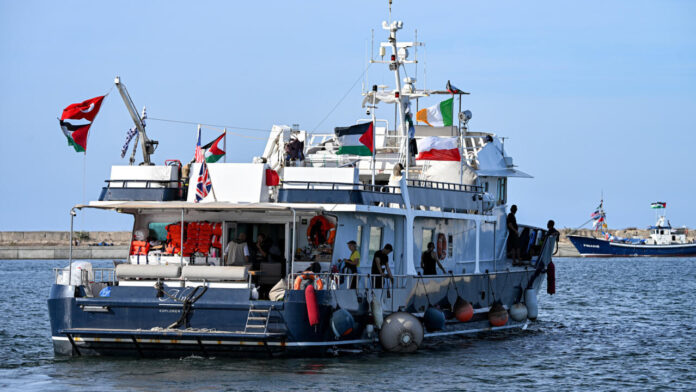Italian Government Intervenes After Reported Attacks in Greek Waters
Italy has sent a naval frigate to provide security for an international humanitarian convoy bound for Gaza, following reports of multiple drone strikes targeting the flotilla off the coast of Greece. The move underscores growing diplomatic tensions surrounding the mission, which activists say has already faced several assaults this month.
Italian Defense Minister Guido Crosetto confirmed the decision late Monday, condemning the “cowardly overnight attacks by unidentified actors.” He authorized the redeployment of the Italian warship Fasan, already stationed north of Crete for Operation Safe Sea, to assist the convoy and safeguard Italian citizens onboard.
Reports of Drone Attacks on Humanitarian Fleet

The Global Sumud Flotilla, an aid initiative consisting of more than 50 vessels and activists from 44 countries, claimed it was subjected to a coordinated aerial assault on September 24. According to organizers, at least 15 drones dropped “unidentified objects” on around 10 vessels, resulting in 13 explosions.
No injuries were reported, but several boats sustained visible damage. Activists described a range of disruptive tactics, including:
-
Sound bombs and explosive flares
-
Suspected chemical sprays
-
Interference with radio communications
One American participant, Greg Stoker, reported that their communication systems were hijacked, broadcasting ABBA songs instead of radio signals. Brazilian activist Thiago Ávila described the experience as “a psychological and physical assault intended to deter our mission.”
Videos released by flotilla members show flashes and explosions in the surrounding waters. However, Greek coast guard officials said they found no evidence of significant damage when they inspected the convoy.
Italy’s Diplomatic Response

Italian Foreign Minister Antonio Tajani, currently attending the United Nations General Assembly in New York, demanded that Israel guarantee the safety of Italian nationals, including members of the Italian Parliament and European representatives traveling with the flotilla.
The Italian Ministry of Foreign Affairs had previously warned Israel that any security operation involving the flotilla must comply with international law and the principle of maximum precaution.
Meanwhile, Prime Minister Giorgia Meloni took a more cautious stance. Speaking from New York, she described the flotilla as “irresponsible and dangerous” while still condemning the attacks. Meloni suggested that the humanitarian cargo be handed over in Cyprus or via the Latin Patriarchate of Jerusalem, rather than attempting to directly breach the blockade of Gaza.
Background: Flotilla Challenges Gaza Blockade
The Global Sumud Flotilla departed Barcelona on August 31 with the aim of challenging Israel’s 18-year naval blockade of Gaza, imposed in 2007. The mission seeks to deliver around 250 tons of humanitarian aid, including food, medical supplies, and essential equipment.
Israel, however, has accused the organizers of harboring links to Hamas. In a statement posted on X (formerly Twitter), the Israeli Foreign Ministry warned that the flotilla would not be allowed to “enter an active war zone” and insisted that any aid must be inspected before reaching Gaza.
Israel has proposed unloading the supplies at Ashkelon Marina, from where they could be transported into Gaza after security checks. Activists have rejected the offer, arguing that it undermines their mission to challenge what they describe as an unlawful blockade.
Pattern of Escalating Incidents
The recent drone strike reports mark the third attack this month against the flotilla. Earlier in September, two separate incidents in Tunisia left vessels damaged while docked. UN human rights experts had already urged Israel to halt its threats against the humanitarian convoy and to ensure the safe delivery of aid.
The involvement of high-profile figures, including Swedish climate activist Greta Thunberg, has further heightened international attention. Activists argue that their presence is intended to spotlight the humanitarian crisis in Gaza, where residents face severe shortages of essential goods.
Growing International Stakes
The deployment of an Italian warship highlights the rising diplomatic stakes surrounding the convoy. With activists from more than 40 countries aboard, any escalation risks becoming an international flashpoint.
While Italy balances condemnation of the attacks with warnings against reckless activism, other governments are closely monitoring the situation. Analysts note that how Israel responds in the coming days may influence broader debates at the UN over humanitarian access to Gaza.
Conclusion
The Italian government’s decision to send a naval frigate signals both a protective measure for its citizens and a diplomatic message to Israel. As the Global Sumud Flotilla continues its mission, questions remain over whether humanitarian aid will reach Gaza directly—or be redirected under Israeli supervision.
With tensions mounting and incidents piling up, the convoy’s journey has become not just a humanitarian mission but also a test of international law, diplomacy, and the limits of Israel’s blockade.
Sources: BBC

